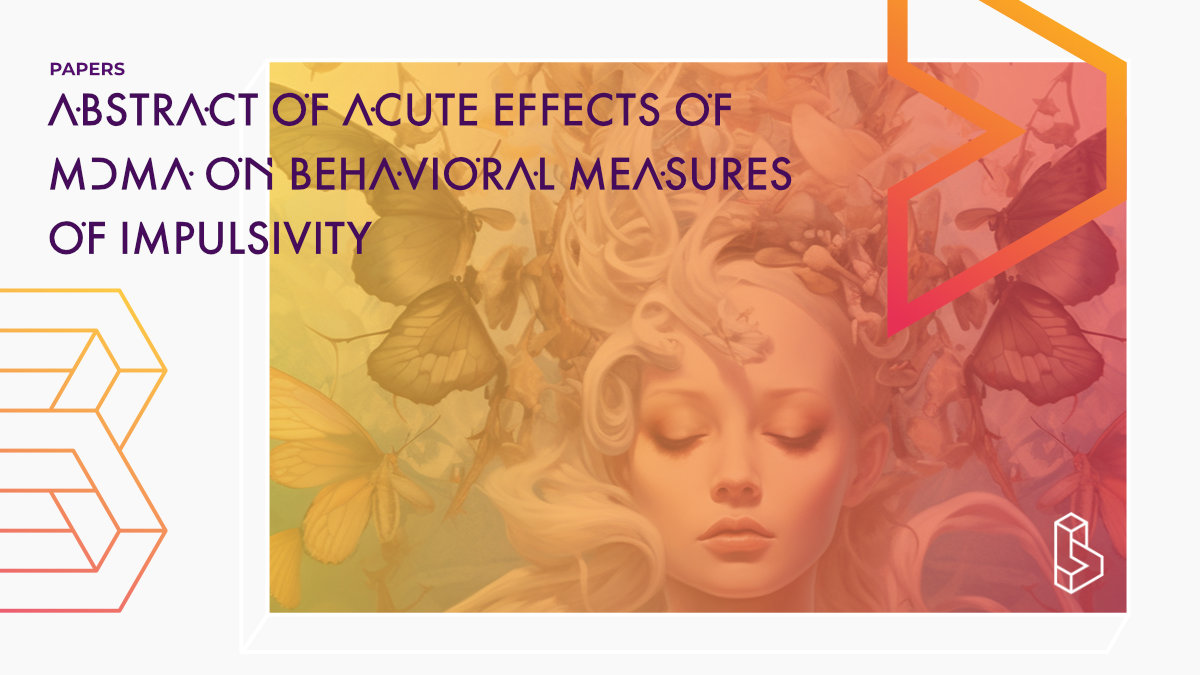This double-blind, placebo-controlled, crossover study (n=18) of MDMA (75-100mg) and alcohol (very low dose) finds that: acute doses of MDMA enhanced impulse control in the stop-signal task; a moderate dose of alcohol negatively impacted participants’ ability to inhibit responses in the stop-signal and go/no-go paradigms; and MDMA didn’t influence the alcohol-induced impairment in response inhibition tasks.
Abstract of Acute effects of MDMA on behavioral measures of impulsivity
“The use of 3,4-methylenedioxymethamphetamine (MDMA) has frequently been associated with increased levels of impulsivity during abstinence. The effects of MDMA on measures of impulsivity, however, have not yet been studied during intoxication. The present study was designed to assess the acute effects of MDMA and alcohol, alone and in combination, on behavioral measures of impulsivity and risk-taking behavior. A total of 18 recreational users of MDMA entered a double-blind placebo-controlled six-way crossover study. The treatments consisted of MDMA 0, 75, and 100 mg with and without alcohol. Alcohol dosing was designed to achieve a peak blood alcohol concentration (BAC) of about 0.06 g/dl during laboratory testing. Laboratory tests of impulsivity were conducted between 1.5 and 2 h post-MDMA and included a stop-signal task, a go/no-go task, and the Iowa gambling task. MDMA decreased stop reaction time in the stop-signal task indicating increased impulse control. Alcohol increased the proportion of commission errors in the stop-signal task and the go/no-go task. Signal detection analyses of alcohol-induced commission errors indicated that this effect may reflect impairment of perceptual or attentive processing rather than an increase of motor impulsivity per se. Performance in the Iowa gambling task was not affected by MDMA and alcohol, but there was a nonsignificant tendency towards improvement following alcohol intake. None of the behavioral measures of impulsivity showed an MDMA × alcohol interaction effect. The lack of interaction indicated that the CNS stimulant effects of MDMA were never sufficient to overcome alcohol-induced impairment of impulse control or risk-taking behavior.”
Authors: Johannes G. Ramaekers & Kim P. C. Kuypers
Summary of Acute effects of MDMA on behavioral measures of impulsivity
3,4-Methylenedioxymethamphetamine (MDMA) is frequently used in combination with psychoactive drugs. Studies have shown that MDMA users have higher levels of impulsivity and risk-taking behaviour than abstinent users, and that dopaminergic activation in the prefrontal cortex is temporarily elevated during MDMA intoxication.
Research on MDMA-related impulsivity has generally relied on subjective questionnaires and self-report, but behavioural measures of impulsivity are more suited to pharmacological studies. These measures support subjective reports of enhanced impulsivity and suggest that heavy MDMA users are more impulsive than nondrug users.
Find this paper
https://doi.org/10.1038/sj.npp.1300894
Open Access | Google Scholar | Backup | 🕊
Cite this paper (APA)
Ramaekers, J. G., & Kuypers, K. P. (2006). Acute effects of 3, 4-methylenedioxymethamphetamine (MDMA) on behavioral measures of impulsivity: alone and in combination with alcohol. Neuropsychopharmacology, 31(5), 1048-1055.
Study details
Compounds studied
MDMA
Topics studied
Safety
Healthy Subjects
Study characteristics
Original
Placebo-Controlled
Double-Blind
Within-Subject
Randomized
Participants
18
Humans
Institutes
Institutes associated with this publication
Maastricht UniversityMaastricht University is host to the psychopharmacology department (Psychopharmacology in Maastricht) where various researchers are investigating the effects of psychedelics.
Compound Details
The psychedelics given at which dose and how many times
MDMA 75 - 100mg | 2x

